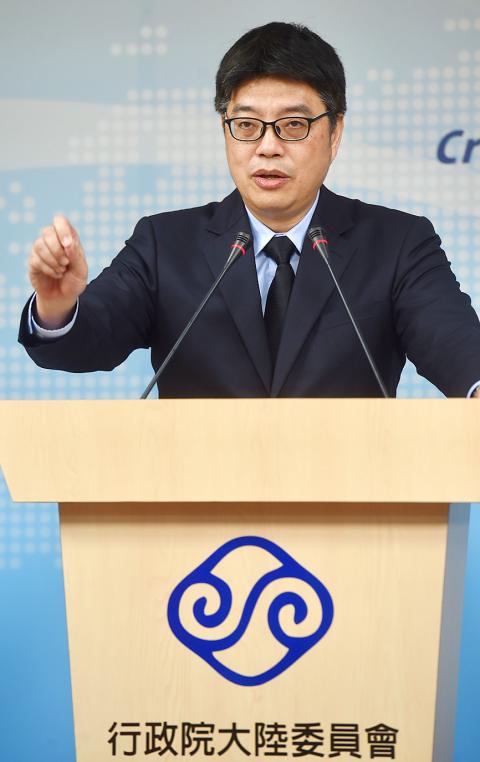Most people in Taiwan, 83.4 percent, do not want to alter the “status quo” between Taiwan and China, an opinion poll commissioned by the Mainland Affairs Council (MAC) published on Thursday found.
Of the respondents who wished to keep the “status quo,” 31.1 percent believed in being able to make decisions on cross-strait relations in the future, while 22.3 percent wished to keep the situation the way it is indefinitely.
Sixteen percent of the respondents who wished to maintain the “status quo” want political integration between the two sides, while 14 percent support independence, the council said.

Photo: Chien Jung-fong, Taipei Times
The intensity of respondents’ desire for future political integration or independence was hard to calculate, as the term “future” could mean 50 years or 100, MAC Deputy Minister and spokesman Chui Chui-cheng (邱垂正) said.
Of the respondents, 8.6 percent wanted Taiwan to declare independence as soon as possible, while 3.1 percent wanted political integration right away.
According to MAC records, the number of respondents who wanted Taiwan to declare independence as soon as possible and the number who wanted to keep the “status quo” with future political integration were the highest in 10 years.
Cross-Strait Policy Association secretary-general Wang Chih-sheng (王智盛) said that Beijing’s recent actions toward Taiwan have polarized society.
The survey was conducted by National Chengchi University’s Election Study Center from Oct. 24 to 28.
The poll collected 1,085 valid responses from adults older than 20 and had a margin of error of plus or minus 2.98 percentage points.

Taiwan is stepping up plans to create self-sufficient supply chains for combat drones and increase foreign orders from the US to counter China’s numerical superiority, a defense official said on Saturday. Commenting on condition of anonymity, the official said the nation’s armed forces are in agreement with US Admiral Samuel Paparo’s assessment that Taiwan’s military must be prepared to turn the nation’s waters into a “hellscape” for the Chinese People’s Liberation Army (PLA). Paparo, the commander of the US Indo-Pacific Command, reiterated the concept during a Congressional hearing in Washington on Wednesday. He first coined the term in a security conference last

Prosecutors today declined to say who was questioned regarding alleged forgery on petitions to recall Democratic Progressive Party (DPP) legislators, after Chinese-language media earlier reported that members of the Chinese Nationalist Party (KMT) Youth League were brought in for questioning. The Ministry of Justice Investigation Bureau confirmed that two people had been questioned, but did not disclose any further information about the ongoing investigation. KMT Youth League members Lee Hsiao-liang (李孝亮) and Liu Szu-yin (劉思吟) — who are leading the effort to recall DPP caucus chief executive Rosalia Wu (吳思瑤) and Legislator Wu Pei-yi (吳沛憶) — both posted on Facebook saying: “I

The Ministry of Economic Affairs has fined Taobao NT$1.2 million (US$36,912) for advertisements that exceed its approved business scope, requiring the Chinese e-commerce platform to make corrections in the first half of this year or its license may be revoked. Lawmakers have called for stricter enforcement of Chinese e-commerce platforms and measures to prevent China from laundering its goods through Taiwan in response to US President Donald Trump’s heavy tariffs on China. The Legislative Yuan’s Finance Committee met today to discuss policies to prevent China from dumping goods in Taiwan, inviting government agencies to report. Democratic Progressive Party Legislator Kuo Kuo-wen (郭國文) said

The Ministry of Economic Affairs has fined Taobao NT$1.2 million (US$36,900) for advertisements that exceeded its approved business scope and ordered the Chinese e-commerce platform to make corrections in the first half of this year or its license would be revoked. Lawmakers have called for stricter supervision of Chinese e-commerce platforms and more stringent measures to prevent China from laundering its goods through Taiwan as US President Donald Trump’s administration cracks down on origin laundering. The legislature’s Finance Committee yesterday met to discuss policies to prevent China from dumping goods in Taiwan, inviting government agencies to report on the matter. Democratic Progressive Party